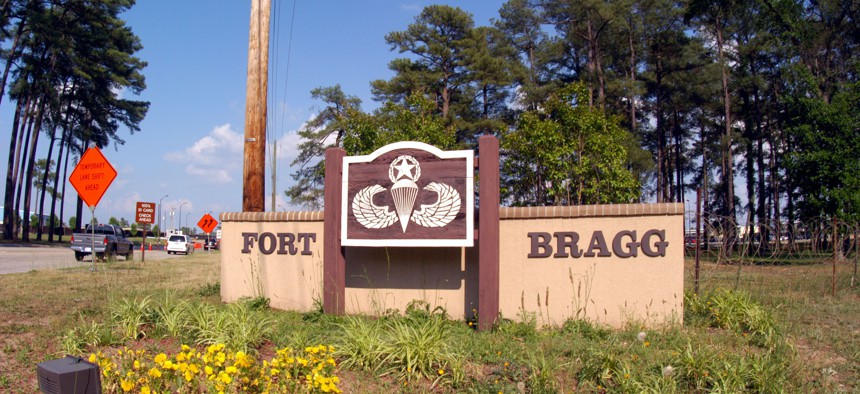
SIgn in front of Ft. Bragg, N.C. Getty Images / Logan Mock-Bunting
Fort Bragg as Fort Liberty? Commission Announces Names to Erase Confederate Ties
Army leaders fighting over glory, not racism, drove the choice of “Liberty,” source says.
The Army’s Fort Bragg would become Fort Liberty under recommendations released Tuesday by a commission that studied whether military bases with Confederate ties should be renamed. The commission also suggests that eight other bases be renamed for military heroes.
Some Twitter users called the choice of “Fort Liberty” “lazy” and “jingoistic.”
However, a source familiar with the commission’s deliberations told Defense One that the suggested name for the North Carolina base, which is home to Army Special Operations Command, was driven by parochial posturing, not racism. Leaders of various Army units, including some in the special operations community, didn’t want the base to be “named for anyone not from their tribe,” and vetoed some of the candidates. Members of the local community pushed for Liberty, which represents a founding value for both the nation and the Army, according to a press release from the commission.
Congress created the commission in the 2021 Defense Authorization Act as part of an effort to address systemic racism in the military. The panel will share its final report on renaming the nine bases with lawmakers no later than Oct. 1. That report is also expected to include an estimate of the cost of making the changes. The final names were picked from a list of 34,000 suggestions made by the American public, which was whittled down to fewer than 100 finalists. If the recommendations are adopted, some of the bases will make history as the first named for women and Black Americans.
Ty Seidule, vice chair of the naming commission, told reporters that Defense Secretary Lloyd Austin has the authority to direct base namings. But the next steps, and whether Congress has a say in the decision, are a bit murkier.
One lawmaker is already expected to fight the name changes on Capitol Hill. A robocall supporting Rep. Mo Brooks, R-Ala., in his Senate primary on Tuesday said the congressman will “filibuster this evil nonsense” if he wins the seat, the Washington Post reported, though it did not state what bill or spending proposal he may try to stall. The campaign said it agreed with the call’s message and that Brooks “has been outspoken that we shouldn’t be replacing monuments.”
“The Commission believes Austin has sole authority to approve the names,” the source said. “But if you check DOD's recent communications with Congress, DOD said he doesn't have the authority. So that's the awkwardness."
If it is entirely up to Austin, the new names will likely win easy approval. The defense secretary released a statement saying he was “pleased” to see the recommendations and looked forward to the final report, but made no mention of consulting with lawmakers or seeking further approval from Congress. “Today's announcement highlights the Commission's efforts to propose nine new installation names that reflect the courage, values, sacrifices, and diversity of our military men and women,” he said.
Don't miss:
Democrats also quickly praised the recommendations. Rep. Adam Smith, D-Wash., chair of the House Armed Services Committee, said the new base names represent “a new opportunity to foster a more inclusive environment for our service members.”
Rep. Anthony Brown, D-Md., a retired Army officer and member of the House Armed Services Committee, also commended the changes.
“I learned to fly helicopters at Ft. Rucker. I deployed to Iraq from Ft. Bragg, and I earned my jump wings at Ft. Benning. All these bases honored men who wouldn't want me or other Black Americans serving in uniform,” Brown said in a statement. “We cannot ask today’s servicemen and women to defend our country, while housing and training them and their families on installations celebrating those who betrayed our country in order to enslave others and preserve white supremacy.”
Of the nine bases expected to get new names, two are named for Black Americans. Asked why so many bases were renamed for white men, members of the commission said that they had to make difficult decisions because there are so many military heroes and a small number of bases.
“It was a privilege to identify a group of Americans that all Americans can draw inspiration from and that help us move past a time when major American installations were named for people who took up arms against the government,” said Kori Schake, a former Pentagon official and member of the naming commission.
The recommended new base names are:
- Fort Benning, Ga., to become Fort Moore after Hal Moore, a retired lieutenant general, and Julia Moore. Hal received the Distinguished Service Cross for actions during the Vietnam War; and his wife Julia changed how the military notifies family members of casualties to deliver the news in a more compassionate way.
- Fort Bragg, N.C., to become Fort Liberty after the founding principles of the nation, and the 82nd Airborne Division’s song that goes “We’re all-American [and] proud to be, for we are the soldiers of liberty.”
- Fort Gordon, Ga., to become Fort Eisenhower after President Dwight D. Eisenhower, who served as supreme commander of the allied expeditionary force in Europe during World War II before becoming president.
- Fort A.P. Hill, Va., to become Fort Walker after Dr. Mary Walker, who volunteered as a civilian to be a doctor for troops during the Civil War because she was not allowed to join the military as a woman.
- Fort Hood, Texas, to become Fort Cavazos after Richard Cavazos, a Texan who received the Distinguished Service Cross during the Korean War.
- Fort Lee, Va., to become Fort Gregg-Adams after two Army logisticians. Arthur Gregg enlisted to work on supply logistics in Germany during World War II, applied to officer candidate school when the military was desegregated, and retired as a lieutenant general. Lt. Col. Charity Adams joined the military after the attack on Pearl Harbor and led a postal battalion in Europe during the war.
- Fort Pickett, Va., to become Fort Barfoot after 2nd Lt. Van T. Barfoot, who received the Medal of Honor for actions during World War II.
- Fort Polk, La., to become Fort Johnson for Sgt. William Henry Johnson, who received the Medal of Honor for fighting Germans first with grenades, then with bullets, then with the butt of his rifle before resorting to a knife during World War I.
- Fort Rucker, Ala., to become Fort Novosel for Chief Warrant Officer 4 Michael Novosel Sr., who earned the Medal of Honor during Vietnam for flying an aircraft through enemy fire to save 29 men.
Kevin Baron contributed to this report.







